Related Research Articles

Year 1170 (MCLXX) was a common year starting on Thursday of the Julian calendar.

Thomas Becket, also known as Saint Thomas of Canterbury, Thomas of London and later Thomas à Becket, was Archbishop of Canterbury from 1162 until his murder in 1170. He is venerated as a saint and martyr by the Catholic Church and the Anglican Communion. He engaged in conflict with Henry II, King of England, over the rights and privileges of the Church and was murdered by followers of the king in Canterbury Cathedral. Soon after his death, he was canonised by Pope Alexander III.
Becket or The Honour of God is a 1959 play written in French by Jean Anouilh. It is a depiction of the conflict between Thomas Becket and King Henry II of England leading to Becket's assassination in 1170. It contains many historical inaccuracies, which the author acknowledged.

Murder in the Cathedral is a verse drama by T.S. Eliot, first performed in 1935, that portrays the assassination of Archbishop Thomas Becket in Canterbury Cathedral during the reign of Henry II in 1170. Eliot drew heavily on the writing of Edward Grim, a clerk who was an eyewitness to the event.
In the medieval Roman Catholic church there were several Councils of Tours, that city being an old seat of Christianity, and considered fairly centrally located in France.
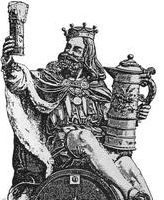
Gambrinus is a legendary European culture hero celebrated as an icon of beer, brewing, joviality, and joie de vivre. Traditional songs, poems, and stories describe him as a king, duke, or count of Flanders and Brabant. Typical representations in the visual arts depict him as a rotund, bearded duke or king, holding a tankard or mug, and sometimes with a keg nearby.
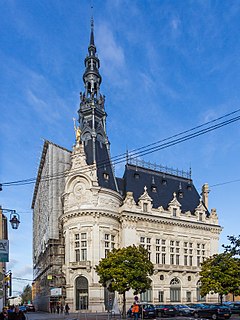
Sens is a commune in the Yonne department in Bourgogne-Franche-Comté in north-central France, 120 km from Paris.
Aventinus may refer to:
Robert of Melun was an English scholastic Christian theologian who taught in France, and later became Bishop of Hereford in England. He studied under Peter Abelard in Paris before teaching there and at Melun, which gave him his surname. His students included John of Salisbury, Roger of Worcester, William of Tyre, and possibly Thomas Becket. Robert was involved in the Council of Reims in 1148, which condemned the teachings of Gilbert de la Porrée. Three of his theological works survive, and show him to have been strictly orthodox.
Becket is a play about Thomas Becket, written in French by Jean Anouilh.

Roger de Pont L'Évêque was Archbishop of York from 1154 to 1181. Born in Normandy, he preceded Thomas Becket as Archdeacon of Canterbury, and together with Becket served Theobald of Bec while Theobald was Archbishop of Canterbury. While in Theobald's service, Roger was alleged to have committed a crime which Becket helped to cover up. Roger succeeded William FitzHerbert as archbishop in 1154, and while at York rebuilt York Minster, which had been damaged by fire.
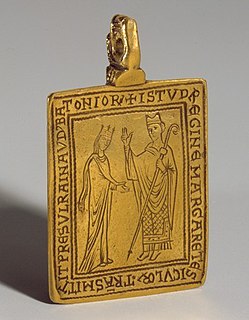
Reginald fitz Jocelin was a medieval Bishop of Bath and an Archbishop of Canterbury-elect in England. A member of an Anglo-Norman noble family, he was the son of a bishop, and was educated in Italy. He was a household clerk for Thomas Becket, but by 1167 he was serving King Henry II of England. He was also a favourite of King Louis VII of France, who had him appointed abbot of the Abbey of Corbeil. After Reginald angered Becket while attempting to help negotiate a settlement between Becket and the king, Becket called him "that offspring of fornication, that enemy to the peace of the Church, that traitor." When he was elected as a bishop, the election was challenged by King Henry's eldest son, Henry the Young King, and Reginald was forced to go to Rome to be confirmed by Pope Alexander III. He attended the Third Lateran Council in 1179, and spent much of his time administering his diocese. He was elected Archbishop of Canterbury in 1191, but died before he could be installed.
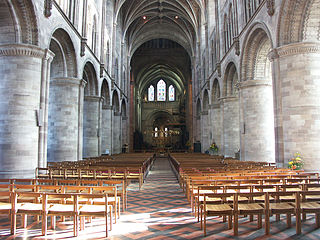
Gilbert Foliot was a medieval English monk and prelate, successively Abbot of Gloucester, Bishop of Hereford and Bishop of London. Born to an ecclesiastical family, he became a monk at Cluny Abbey in France at about the age of twenty. After holding two posts as prior in the Cluniac order he was appointed Abbot of Gloucester Abbey in 1139, a promotion influenced by his kinsman Miles of Gloucester. During his tenure as abbot he acquired additional land for the abbey, and may have helped to fabricate some charters—legal deeds attesting property ownership—to gain advantage in a dispute with the Archbishops of York. Although Foliot recognised Stephen as the King of England, he may have also sympathised with the Empress Matilda's claim to the throne. He joined Matilda's supporters after her forces captured Stephen, and continued to write letters in support of Matilda even after Stephen's release.

Edward Grim was a monk from Cambridge who visited Canterbury Cathedral on Tuesday 29 December 1170 when Thomas Becket was murdered. He researched and published a book, Vita S. Thomae in about 1180, which is today known chiefly for a short section in which he gave an eyewitness account of the events in the cathedral.

Becket is a 1964 British historical drama film about the historic, tumultuous relationship between Henry II of England and his friend-turned-bishop Thomas Becket. It is a dramatic film adaptation of the 1959 play Becket or the Honour of God by Jean Anouilh made by Hal Wallis Productions and released by Paramount Pictures. It was directed by Peter Glenville and produced by Hal B. Wallis with Joseph H. Hazen as executive producer. The screenplay was written by Edward Anhalt based on Anouilh's play. The music score was by Laurence Rosenthal, the cinematography by Geoffrey Unsworth and the editing by Anne V. Coates.
Events from the 1170s in England.

Saint-Avertin is a commune in the Indre-et-Loire department in central France.

The Becket controversy or Becket dispute was the quarrel between Archbishop of Canterbury Thomas Becket and King Henry II of England from 1163 to 1170. The controversy culminated with Becket's murder in 1170, and was followed by Becket's canonization in 1173 and Henry's public penance at Canterbury in July 1174.
Aventin was a French saint and hermit of the 8th century.
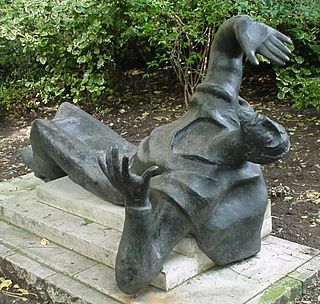
The statue of Thomas Becket (1970) by Edward Bainbridge Copnall is installed in St Paul's Churchyard in London, United Kingdom.
References
- ↑ St. Aventinus, Catholic.org; accessed 8 June 2017.